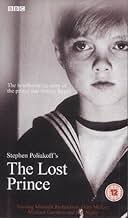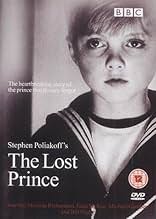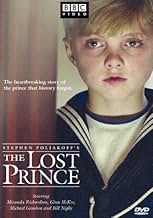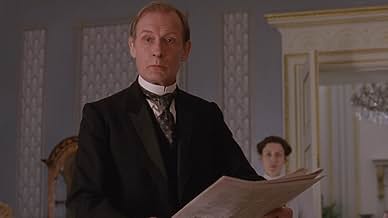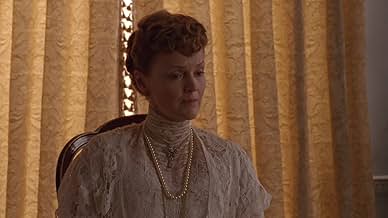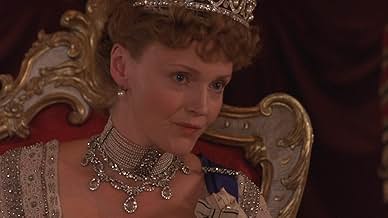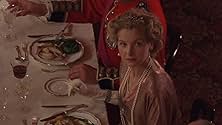NOTE IMDb
7,6/10
2,2 k
MA NOTE
Ajouter une intrigue dans votre langueThe story of Prince John, the autistic and epileptic youngest son of Queen Mary and King George V, who spent his whole life hidden away from public view and died at the age of 13 in 1919.The story of Prince John, the autistic and epileptic youngest son of Queen Mary and King George V, who spent his whole life hidden away from public view and died at the age of 13 in 1919.The story of Prince John, the autistic and epileptic youngest son of Queen Mary and King George V, who spent his whole life hidden away from public view and died at the age of 13 in 1919.
- Récompensé par 3 Primetime Emmys
- 8 victoires et 21 nominations au total
Parcourir les épisodes
Avis à la une
This short drama focused on the epileptic Prince John, son of George V and Queen Mary, and brother to the present Queen Elizabeth's father, George VI.
We see the story of John from the perspectives of himself and of his nurse, Lalla (the emotionless Gina McKee). As he becomes more out of control and an embarrassment to his family, the little boy becomes more special to the viewer. Johnny is a crank but a lovable one.
Daniel Williams and Matthew Thomas both make an impact as Prince John at different ages, while Tom Hollander and Miranda Richardson are excellent as his repressed and bewildered parents. There's also key roles of interest for Bill Nighy (Stamfordham), Frank Finlay (the PM, Herbert Asquith), and David Barrass (Kaiser Bill).
Aside from the problems accorded by John's illness and confinement, we also see how events unfold in Russia for George V's cousins, the ill-fated Romanov family.
'The Lost Prince' is another winner for writer/director Stephen Poliakoff, and well worth your time. Enjoyable whether you know the story or the intricacies of the Royal family, or not.
We see the story of John from the perspectives of himself and of his nurse, Lalla (the emotionless Gina McKee). As he becomes more out of control and an embarrassment to his family, the little boy becomes more special to the viewer. Johnny is a crank but a lovable one.
Daniel Williams and Matthew Thomas both make an impact as Prince John at different ages, while Tom Hollander and Miranda Richardson are excellent as his repressed and bewildered parents. There's also key roles of interest for Bill Nighy (Stamfordham), Frank Finlay (the PM, Herbert Asquith), and David Barrass (Kaiser Bill).
Aside from the problems accorded by John's illness and confinement, we also see how events unfold in Russia for George V's cousins, the ill-fated Romanov family.
'The Lost Prince' is another winner for writer/director Stephen Poliakoff, and well worth your time. Enjoyable whether you know the story or the intricacies of the Royal family, or not.
10jeffkauf
This production is outstanding in every way: style, substance and sensitivity. A remarkable glimpse at a remarkable time in Western history told via a very personal and touching biography. Director, Stephen Poliakoff has done what is rare: the combination of otherwise cold dates, places and faces brought to the level of high art. As far as casting is concerned, again quite outstanding. Every role seems as though it were created for the talented actor that inhabited it. Special kudos to Miranda Richardson as Queen Mary, Gina McKee as Prince John's nanny Lala and Bill Nighy as Stamfordham: King George's private secretary. Lastly, congratulations to Adrian Johnston for a lovely and most appropriate musical score.
This lavish production, uses the vehicle of the short life "The Lost (from history) Prince" to portray what Royal Life was like at the turn of century. The sumptuous production illustrates the splendour, luxury, misery and ultimately the futility of the Royals. There are wonderful images of the beautiful daughters of the tsar. Epileptic Prince John is however seen as the only one as being allowed to be himself. Wonderful performances of the roles of the ice queen Queen Mary, Lalla the nursemaid, Prince John young and old.Has been criticised for being too long, but you must try and get to see this when it comes to your country.
Historical facts, Prince John died aged 14 isolated from his family in a farmhouse at Sandringham? cared for by Lalla Bill. Only one historical reference to him still existed. The height of George V is still a secret.
Historical facts, Prince John died aged 14 isolated from his family in a farmhouse at Sandringham? cared for by Lalla Bill. Only one historical reference to him still existed. The height of George V is still a secret.
10Alex-372
The Lost Prince is a beautiful costume drama from Stephen Poliakoff, about the young brother of prince George, who nobody wanted to talk about and who was most likely autistic and most definitely epileptic, diseases respectively unknown and misunderstood at the time.
This story is roughly told through his eyes, and describes in beautiful detail the transition of Europe from a continent ruled by related monarchs (many of them Saxe-Coburg and Gotha), until the end of this system during and after WWI. As important historical events manage to find their way into palace life (the suffragette movement, the rise of ordinary people as politicians, the telephone and the motor car), they more often seem like foreign intrusions into the world of the palace.
As this is seen through the eyes of the little boy, there is very little value judgement as to whether this system was a right or just one, and at the end you are struck with the horror of the murder of the tsarist family and their beautiful daughters, but we never see the reign of terror they themselves and their secret police visited upon Russia.
There is a very funny incident when the tsarina during a visit to what she sees as her poor cousins estates, refuses to walk any further, because she has the "wrong shoes" for walking in the grass. Later, she remarks how "close" the houses of "other people" are and you can't help conclude she was simply afraid of being killed by the proletariat. :-)
Very well acted by Miranda Richardson (Blackadder), Michael Gambon, Tom Hollander, Gina McKee as the governess Lalla but especially by the two child actors who play Johnny. They look like great kids rather than brats.
Highly recommended if you can catch this on the BBC or HBO.
This story is roughly told through his eyes, and describes in beautiful detail the transition of Europe from a continent ruled by related monarchs (many of them Saxe-Coburg and Gotha), until the end of this system during and after WWI. As important historical events manage to find their way into palace life (the suffragette movement, the rise of ordinary people as politicians, the telephone and the motor car), they more often seem like foreign intrusions into the world of the palace.
As this is seen through the eyes of the little boy, there is very little value judgement as to whether this system was a right or just one, and at the end you are struck with the horror of the murder of the tsarist family and their beautiful daughters, but we never see the reign of terror they themselves and their secret police visited upon Russia.
There is a very funny incident when the tsarina during a visit to what she sees as her poor cousins estates, refuses to walk any further, because she has the "wrong shoes" for walking in the grass. Later, she remarks how "close" the houses of "other people" are and you can't help conclude she was simply afraid of being killed by the proletariat. :-)
Very well acted by Miranda Richardson (Blackadder), Michael Gambon, Tom Hollander, Gina McKee as the governess Lalla but especially by the two child actors who play Johnny. They look like great kids rather than brats.
Highly recommended if you can catch this on the BBC or HBO.
(Aired over two nights this week on the Canadian station, CBUT, which we get here in Seattle...)
Superbly photographed and exquisitely acted, this movie primarily focuses on England's Prince John, youngest son of George V and Queen Mary who, in his tragically short life, suffered not only from periodic epileptic seizures but was also handicapped by what appeared to be some form of retarded mental development.
The creators of this film were kindly and charitable in not showing the boy's ailments in too negative a light. Enough was shown though to give the viewer to understand that the poor lad had problems - so much so that his immediate family and caretakers felt that he clearly wasn't cut out for royal service. As a result he was whisked away to a sort of royal "nether-world" out in the English countryside, away from public view, where hopefully he would not become an object of curiosity, scorn, ridicule, etc.
Sad though the plight of the boy was, you couldn't help but feel that he and his dysfunctional condition was a metaphor for the plight of the entire royal or aristocratic system which held sway over most all of Europe at the time. The boy's ailments and weaknesses eventually lead to his downfall, and all of this plays out simultaneously with the royal families of Europe (most of whom are shown being connected through marriage or bloodline) attempting to cope quite ineffectually with the onslaught of the tragedy of World War One.
The film includes several scenes of interaction between the British royal family and the Russian royal family (the Czar and Czarina and their wonderful kids). They are closely related, which makes their death (or shall we say murder, at the hands of the Bolsheviks, which is graphically depicted) all the more chilling, tragic and thought provoking.
There is so much to contemplate in this movie that I'd rather not sit here and prattle on about it, but instead would rather simply recommend that people go rent a copy and just watch it. It may not be for everyone, as it is a bit long and covers many facets of early 20th century history that will glide right over your head if you weren't paying attention in history class. But even if you ignore entirely the historical aspects of the movie, it is nonetheless a very touching picture: sad, compelling, and ultimately life-affirming, with wonderful performances and beautifully photographed images that will stick in your mind for a long time to come.
Superbly photographed and exquisitely acted, this movie primarily focuses on England's Prince John, youngest son of George V and Queen Mary who, in his tragically short life, suffered not only from periodic epileptic seizures but was also handicapped by what appeared to be some form of retarded mental development.
The creators of this film were kindly and charitable in not showing the boy's ailments in too negative a light. Enough was shown though to give the viewer to understand that the poor lad had problems - so much so that his immediate family and caretakers felt that he clearly wasn't cut out for royal service. As a result he was whisked away to a sort of royal "nether-world" out in the English countryside, away from public view, where hopefully he would not become an object of curiosity, scorn, ridicule, etc.
Sad though the plight of the boy was, you couldn't help but feel that he and his dysfunctional condition was a metaphor for the plight of the entire royal or aristocratic system which held sway over most all of Europe at the time. The boy's ailments and weaknesses eventually lead to his downfall, and all of this plays out simultaneously with the royal families of Europe (most of whom are shown being connected through marriage or bloodline) attempting to cope quite ineffectually with the onslaught of the tragedy of World War One.
The film includes several scenes of interaction between the British royal family and the Russian royal family (the Czar and Czarina and their wonderful kids). They are closely related, which makes their death (or shall we say murder, at the hands of the Bolsheviks, which is graphically depicted) all the more chilling, tragic and thought provoking.
There is so much to contemplate in this movie that I'd rather not sit here and prattle on about it, but instead would rather simply recommend that people go rent a copy and just watch it. It may not be for everyone, as it is a bit long and covers many facets of early 20th century history that will glide right over your head if you weren't paying attention in history class. But even if you ignore entirely the historical aspects of the movie, it is nonetheless a very touching picture: sad, compelling, and ultimately life-affirming, with wonderful performances and beautifully photographed images that will stick in your mind for a long time to come.
Le saviez-vous
- AnecdotesKing George V had six children, two of whom used the name George. His second son was Prince Albert Frederick Arthur George, known to the family as Bertie, who became King George VI. He had a bad stutter that began in early childhood and lasted into adulthood. His third son, Johnnie's closest sibling in this movie, was Prince George, Duke of Kent. He grew up to live a life that was considered scandalous, and died in a plane crash in 1942.
- GaffesWhen the Romanovs are in England, Alexandra speaks English with a Russian accent. In real life, Alexandra was a German princess raised in England by her grandmother, Queen Victoria. She spoke English with a British accent.
- Citations
Prince George: [Speaking about Prince John] He was the only one of us who was able to be himself.
- ConnexionsFeatured in Masterpiece Theatre: The Lost Prince: Part 1 (2004)
- Bandes originalesRondo for Glass Armonica
(uncredited)
Composed by Joseph Schmittbauer (as J.A. Schmittbauer)
(Queen Alexandra's birthday cake)
Meilleurs choix
Connectez-vous pour évaluer et suivre la liste de favoris afin de recevoir des recommandations personnalisées
Détails
- Date de sortie
- Pays d’origine
- Sites officiels
- Langue
- Aussi connu sous le nom de
- 失落的王子
- Lieux de tournage
- Black Park Country Park, Black Park Road, Wexham, Buckinghamshire, Angleterre, Royaume-Uni(Russian lake, royal car)
- Sociétés de production
- Voir plus de crédits d'entreprise sur IMDbPro
Contribuer à cette page
Suggérer une modification ou ajouter du contenu manquant

